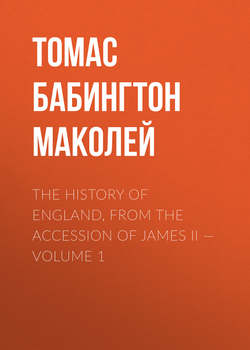The History of England, from the Accession of James II — Volume 1

Реклама. ООО «ЛитРес», ИНН: 7719571260.
Оглавление
Томас Бабингтон Маколей. The History of England, from the Accession of James II — Volume 1
HISTORY OF ENGLAND
CHAPTER I
CHAPTER II
CHAPTER III
CHAPTER IV
CHAPTER V
NOTES
Отрывок из книги
I PURPOSE to write the history of England from the accession of King James the Second down to a time which is within the memory of men still living. I shall recount the errors which, in a few months, alienated a loyal gentry and priesthood from the House of Stuart. I shall trace the course of that revolution which terminated the long struggle between our sovereigns and their parliaments, and bound up together the rights of the people and the title of the reigning dynasty. I shall relate how the new settlement was, during many troubled years, successfully defended against foreign and domestic enemies; how, under that settlement, the authority of law and the security of property were found to be compatible with a liberty of discussion and of individual action never before known; how, from the auspicious union of order and freedom, sprang a prosperity of which the annals of human affairs had furnished no example; how our country, from a state of ignominious vassalage, rapidly rose to the place of umpire among European powers; how her opulence and her martial glory grew together; how, by wise and resolute good faith, was gradually established a public credit fruitful of marvels which to the statesmen of any former age would have seemed incredible; how a gigantic commerce gave birth to a maritime power, compared with which every other maritime power, ancient or modern, sinks into insignificance; how Scotland, after ages of enmity, was at length united to England, not merely by legal bonds, but by indissoluble ties of interest and affection; how, in America, the British colonies rapidly became far mightier and wealthier than the realms which Cortes and Pizarro had added to the dominions of Charles the Fifth; how in Asia, British adventurers founded an empire not less splendid and more durable than that of Alexander.
Nor will it be less my duty faithfully to record disasters mingled with triumphs, and great national crimes and follies far more humiliating than any disaster. It will be seen that even what we justly account our chief blessings were not without alloy. It will be seen that the system which effectually secured our liberties against the encroachments of kingly power gave birth to a new class of abuses from which absolute monarchies are exempt. It will be seen that, in consequence partly of unwise interference, and partly of unwise neglect, the increase of wealth and the extension of trade produced, together with immense good, some evils from which poor and rude societies are free. It will be seen how, in two important dependencies of the crown, wrong was followed by just retribution; how imprudence and obstinacy broke the ties which bound the North American colonies to the parent state; how Ireland, cursed by the domination of race over race, and of religion over religion, remained indeed a member of the empire, but a withered and distorted member, adding no strength to the body politic, and reproachfully pointed at by all who feared or envied the greatness of England.
.....
The King called a third Parliament, and soon perceived that the opposition was stronger and fiercer than ever. He now determined on a change of tactics. Instead of opposing an inflexible resistance to the demands of the Commons, he, after much altercation and many evasions, agreed to a compromise which, if he had faithfully adhered to it, would have averted a long series of calamities. The Parliament granted an ample supply. The King ratified, in the most solemn manner, that celebrated law, which is known by the name of the Petition of Right, and which is the second Great Charter of the liberties of England. By ratifying that law he bound himself never again to raise money without the consent of the Houses, never again to imprison any person, except in due course of law, and never again to subject his people to the jurisdiction of courts martial.
The day on which the royal sanction was, after many delays, solemnly given to this great Act, was a day of joy and hope. The Commons, who crowded the bar of the House of Lords, broke forth into loud acclamations as soon as the clerk had pronounced the ancient form of words by which our princes have, during many ages, signified their assent to the wishes of the Estates of the realm. Those acclamations were reechoed by the voice of the capital and of the nation; but within three weeks it became manifest that Charles had no intention of observing the compact into which he had entered. The supply given by the representatives of the nation was collected. The promise by which that supply had been obtained was broken. A violent contest followed. The Parliament was dissolved with every mark of royal displeasure. Some of the most distinguished members were imprisoned; and one of them, Sir John Eliot, after years of suffering, died in confinement.
.....